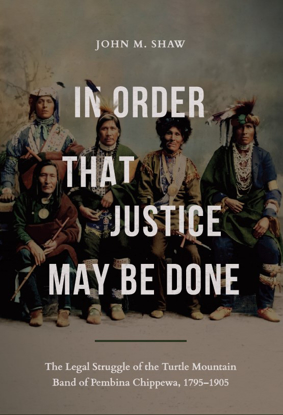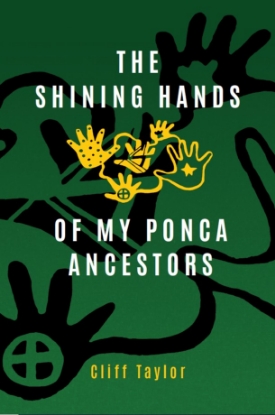New Titles
In Order That Justice May Be Done: The Legal Struggle of the Turtle Mountain Band of Pembina Chippewa, 1795-1905
Tribal lands in tribal hands restrained the pursuit of profit. When the cultural identity of the Turtle Mountain Band of Pembina Chippewa was challenged by European Americans—who conceived of progress in terms of cultivated farmland—a tribal-federal conundrum occurred. Historian John M. Shaw untangles the culturally and legally contested concepts of land and its uses and ownership, providing a dynamic legal genesis of the Turtle Mountain Chippewa and their intentional action for change. Shaw presents a crucial analysis of federal policy and Native American resistance.
“Shaw systematically informs the reader of historical context and lays out the complex cultural influences—the nucleus of an emerging nation—of the Pembina Chippewa, providing unique insights into historical, legal, and political struggles. An overarching theme is the contrast and comparison of Indigenous and Western worldviews relative to international diplomacy. Shaw’s laser focus presents a critical and authentic analysis of social, economic, political, and cultural events that enveloped the Pembina Band of Chippewa and the United States of America.”—Les LaFountain, Tribal Educator and Historian; former Turtle Mountain Band of Chippewa Tribal Council Representative; former Legislative Assistant to the United States Senate Indian Affairs Committee
“In Order That Justice May Be Done is an excellent history of the struggle experienced by the Turtle Mountain Band of Chippewa to gain recognition as a tribe and to gain control of their homeland. The documented efforts of Chief Little Shell and Attorney John Bottineau deserve to be recognized and understood.”—Carol A. Davis, Senior Associate Tribal Nations Research Group; Turtle Mountain Community College Co-founder and Second Interim/Acting TMCC President
LCCN: 2022951183
ISBN: 978-1-946163-56-1
6" x 9"
440 pp., paperback
black & white photos and maps
bibliography and index
Tribal-Federal Relations | History 19th Century | Indian Reservations—Law and Legislation
About the Author: John M. Shaw grew up where George Washington led the Continental Army across the Delaware River and surprised the Hessian garrison at Trenton, New Jersey, on Christmas day, 1776. One of John's earliest childhood memories recalls his parents bundling him up on Christmas mornings to watch the annual reenactment. This tradition sparked his lifelong interest and passion for history, culmininating in an MA in American Indian Studies and a PhD in History, both from The University of Arizona.
In graduate school, a colleague informed John about a compelling microfilm of an eloquent prayer, address, and legal brief on behalf of the Turtle Mountain Band of Pembina Chippewa. Compiled by Métis tribal citizen and attorney John B. Bottineau, these inspiring documents provided a unique Indigenous perspective on the injustices of federal Indian policy. The tribe's legal struggle for land, sovereignty, and justice derived from the power to narrate their own side of the story through articulate chiefs and delegations, confirming that North Dakota's most populace Indigenous community remain a powerful people with a compelling history.
John contributed multiple entries to Making it in America: A Sourcebook on Eminent Ethnic Americans (2000) and The Encyclopedia of United States-American Indian Policy, Relations, and Law (2008), as well as several book reviews for UCLA's American Indian Culture and Research Journal and the New Mexico Historical Review. He has taught Native American and U.S. History courses for the departments of American Indian Studies, American Multicultural Studies, and History at The University of Arizona (1996–2003), Minnesota State University Moorhead (2004–2005), and Portland (Oregon) Community College (2005–present).
The Shining Hands of My Ponca Ancestors
In sincere, from-the-heart storytelling, The Shining Hands of My Ponca Ancestors depicts the life of a young, contemporary Ponca, who—with the help of friends, relatives, spirits, and ancestors—is learning what is really possible for him and his tribe and how dramatically different that is from the dominant cultural messaging of his youth. An account of inspiration, ancestor intervention, the indestructible Indigenous core of his Native people, and the immense beauty of an ongoing way of life, Shining Hands is rife with meaning for Native and non-Native readers alike. Viewed through his personal life, Shining Hands is a prayer for the young that they may see their own powerful potential, too.
Tribal History & Culture Series Paperback Set
The North Dakota Tribal History & Culture book series teaches students about the Indigenous nations that share geography with the state. The goal of the series is for North Dakotans from these nations to explain their cultures in their own words. The books are written by experts, scholars, and Elders from each nation, with review by the North Dakota Tribal College System. The provided content is distributed by the North Dakota Department of Public Instruction, North Dakota State University Press, and North Dakota Tribal College System. The original books were released from 1995-2002, with the current revised edition released in 2026. The books are used in the 8th grade and high school North Dakota Studies classes, as well as in higher education. The revision was prompted by the passage of North Dakota Senate Bill 2304 in 2021, which mandates that all elementary and secondary public and nonpublic schools include Native American history and culture in their curriculums.
The titles in this five-volume set are:
- History & Culture of the Mandan, Hidatsa, & Sahnish (Arikara)
- History & Culture of the Mni Wakan Oyate Spirit Lake Nation
- History & Culture of the Sisseton-Wahpeton Oyate
- History & Culture of the Standing Rock Oyate
- History & Culture of the Turtle Mountain Band of Chippewa
The Sisseton Wahpeton Oyate nation (Dakota: Sisíthuŋwaŋ Waȟpéthuŋwaŋ Oyáte) also shares geography with North Dakota. However, the original four History & Culture books did not include a fifth book for Sisseton Wahpeton because Agency Village, its capitol, is outside the state. In North Dakota, the general vicinity around the Lake Traverse Indian Reservation is referred to as "South Dakota."
Printing for this project takes place at the United Tribes Technical College (spiral bound) and Sisseton-Wahpeton Oyate College (paperback).


























